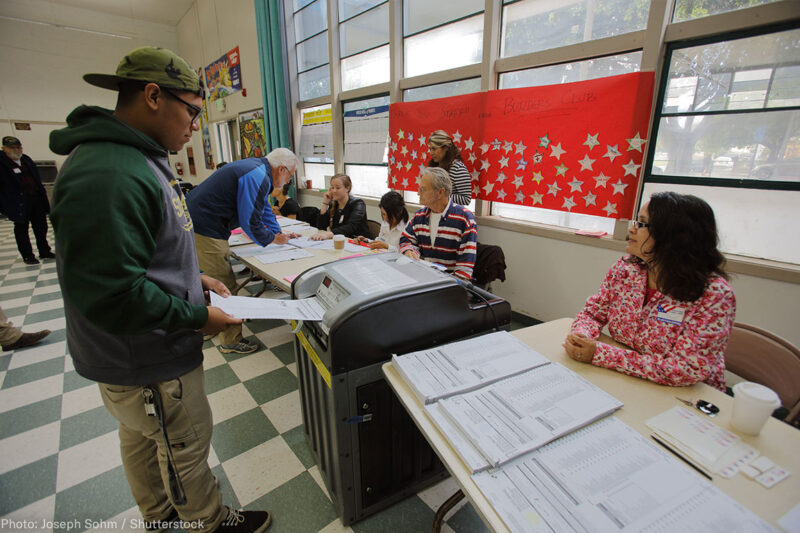
UPDATE (11/06/2018):
Kansas: Kris Kobach, the state's Republican secretary of state, has lost the governor's race to Democrat Laura Kelly.
Last year, when President Trump convened a commission ostensibly to combat rampant voter fraud — a claim for which he had no evidence — he tried to pressure state election officials into participating in his scheme by turning over personal voter data. Many refused, and the ACLU joined activists and organizations in successfully fighting to disband the commission.
But the battle to protect our democracy is far from over. It will depend on Americans asking candidates where they stand on voting rights and making sure they’re committed to policies that support free and fair elections.
In 24 states, the secretary of state serves as the chief elections official, overseeing voter registration and managing elections. While these officials may not receive much media attention, their actions can determine where elections are fair and the rights of voters are protected.
In Arizona, one candidate for secretary of state, Steve Gaynor, is promising to challenge landmark civil rights laws and abandon democratic principles.
Gaynor, the Republican nominee, thinks ballots and election materials should only be provided in English — a direct attack on the Voting Rights Act, which ensured access to bilingual voting materials. Differences in language proficiency should not prevent any American from participating in elections. But Gaynor has said he would support repealing that requirement. If he had his way, over 900,000 Arizonans who can receive ballots with languages other than English would find it more difficult to exercise their rights.
That’s not all. Gaynor has called for the repeal of the National Voter Registration Act (NVRA), which expanded access to voter registration, and wants to withdraw from a state consent decree that helped thousands of Arizonans register to vote.
Arizona has had significant voting rights problems. In August, the ACLU sued the current Secretary of State Michele Reagan, who was defeated by Gaynor in the Republican primary, for failing to update registered voters’ information when they changed addresses on their driver’s license. That violation of the NVRA jeopardized the voting rights of thousands of Arizonans.
Some secretaries of state are already working to make voting more difficult.
In Kansas, Secretary of State Kris Kobach, who is now running for governor, turned his state into a testing ground for voter suppression policies. He stopped thousands of eligible Kansans from registering to vote and casting a ballot, and harnessed his close ties to Trump to attack voting rights nationwide by attempting to change the NVRA and the Census. He also led Trump’s commission on supposed voter fraud.
The ACLU has fought back against Kobach’s attacks on democracy, and successfully challenged his onerous voting restrictions that disenfranchised tens of thousands of Kansans. But Kobach isn’t the only secretary of state misusing the authority of that office.
Another secretary of state, Ohio’s Jon Husted, carried out a voter purge process that removed hundreds of thousands of voters from the rolls simply for missing prior elections. While the Supreme Court later upheld this practice in a case brought by the ACLU and Demos, Kathleen Clyde, the Democratic candidate to succeed Husted, has said that she would end the purge practices, while the Republican candidate, Frank LaRosa, has vowed to uphold the process.
Secretaries of state can also curtail voting rights simply by refusing to do their jobs of managing elections properly.
In Georgia, Secretary of State Brian Kemp, who is the Republican candidate for governor, put around 53,000 voter registration applications on hold, and wants to reject mail-in absentee ballots over alleged signature mismatches without providing notice or a chance of appeal. That move has been temporarily blocked by a federal judge following an ACLU lawsuit. By declining to process these registration applications and count valid absentee ballots, Kemp could stop many eligible voters from exercising their rights in their state’s hotly contested gubernatorial race.
Americans deserve secretaries of state who will safeguard elections and are committed to defending our rights.
Stay informed
Sign up to be the first to hear about how to take action.
By completing this form, I agree to receive occasional emails per the terms of the ACLU's privacy statement.
By completing this form, I agree to receive occasional emails per the terms of the ACLU's privacy statement.

